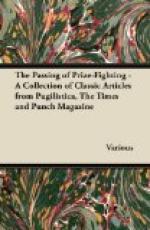Impelled by such a sense of duty, we wended our way to the “royal property,” to take a last look at the long-expiring gardens. It was a wet night—the lamps burnt dimly—the military band played in the minor key—the waiters stalked about with so silent, melancholy a tread, that we took their towels for pocket-handkerchiefs; the concert in the open rain went off tamely—dirge-like, in spite of the “Siege of Acre,” which was described in a set of quadrilles, embellished with blue fire and maroons, and adorned with a dozen double drums, thumped at intervals, like death notes, in various parts of the doomed gardens. The divertissement was anything but diverting, when we reflect upon the impending fate of the “Rotunda,” in which it was performed.
No such damp was, however, thrown over the evolutions of “Ducrow’s beautiful horses and equestrian artistes,” including “the new grand entree, and cavalcade of Amazons.” They had no sympathy with the decline and fall of the Simpsonian empire. They were strangers, interlopers, called in like mutes and feathers, to grace the “funeral show,” to give a more graceful flourish to the final exit. The horses pawed the sawdust, evidently unconscious that the earth it covered would soon “be let on lease for building ground;” the riders seemed in the hey-day of their equestrian triumph. Let them, however, derive from the fate of Vauxhall, a deep, a fearful lesson!—though we shudder as we write, it shall not be said that destruction came upon them unawares—that no warning voice had been raised—that even the squeak of PUNCH was silent! Let them not sneer, and call us superstitious—we do not give credence to supernatural agency as a fixed and general principle; but we did believe in Simpson, and stake our professional reputation upon Widdicomb.
That Vauxhall gardens were under the especial protection of, that they drew the very breath of their attractiveness from, the ceremonial Simpson, who can deny? When he flitted from walk to walk, from box to box, and welcomed everybody to the “royal property,” right royally did things go on! Who would then have dreamt that the illustrious George—he of the Piazza—would ever be “honoured with instructions to sell;” that his eulogistic pen would be employed in giving the puff superlative to the Elysian haunts of quondam fashion—in other words, in painting the lily, gilding refined gold? But, alas! Simpson, the tutelar deity, has departed ("died,” some say, but we don’t believe it), and at the moment he made his last bow, Vauxhall ought to have closed; it was madness—the madness which will call us, peradventure, superstitious—which kept the gates open when Simpson’s career closed—it was an anomaly, for like Love and Heaven, Simpson was Vauxhall, and Vauxhall was Simpson!
Let Ducrow reflect upon these things—we dare not speak out—but a tutelar being watches over, and giveth vitality to his arena—his ring is, he may rely upon it, a fairy one—while that mysterious being dances and prances in it, all will go well; his horses will not stumble, never will his clowns forget a syllable of their antiquated jokes. O! let him then, while seriously reflecting upon Simpson and the fate of Vauxhall, give good heed unto the Methuselah, who hath already passed his second centenary in the circle!




